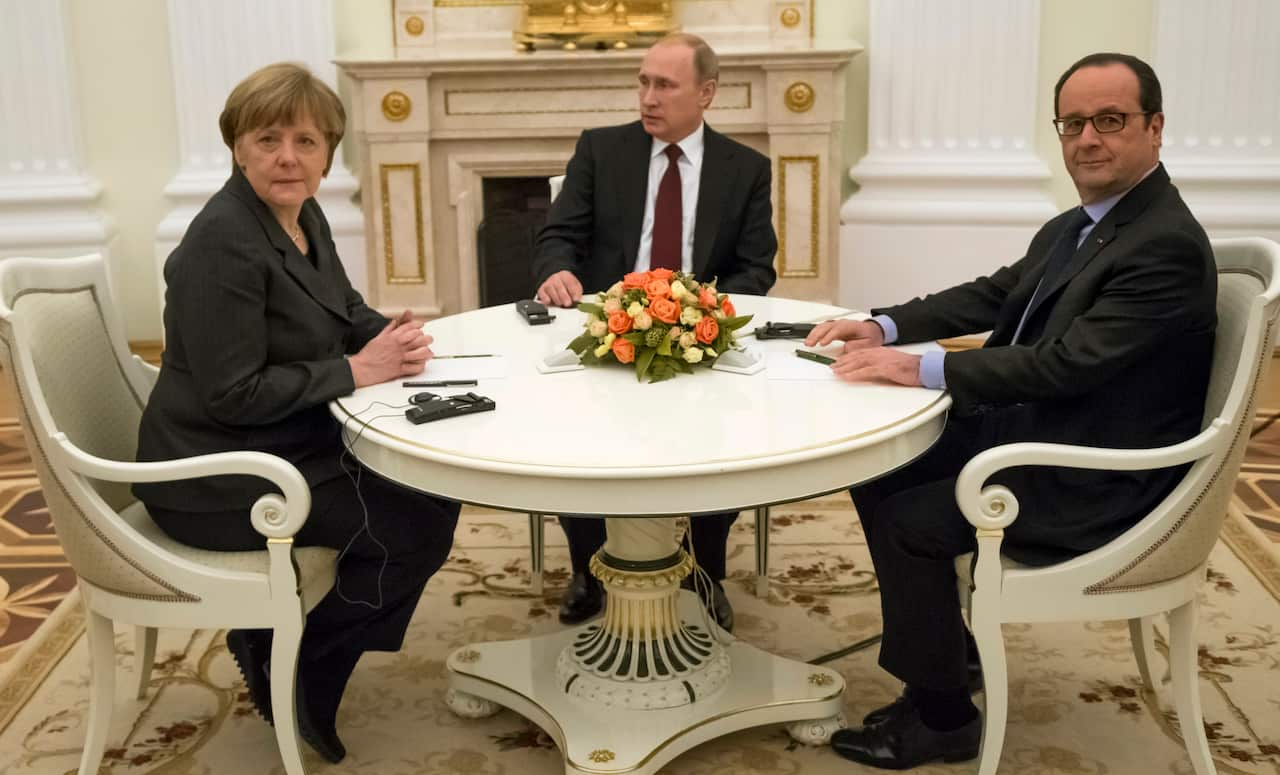Details about what that deal offers are sketchy but it’s reportedly based on the Minsk agreements co-signed last September by Russia, but never implemented. It adds a demilitarised zone along the current frontline, policed by peacekeepers.
The Minsk agreement called for an immediate ceasefire, the withdrawal of foreign troops, the return of eastern Ukraine to Ukrainian government control and critically, more autonomy for the vast separatist controlled regions. No-one adhered to it. Indeed, the war between the pro Russia separatists and Ukraine unrelentingly ground on. The death toll now stands at more than 5,000 with some 1.5 million people displaced. The separatists have taken more territory, the exact opposite of what the agreement envisaged. When Angela Merkel and Françoise Hollande flew to Moscow over the weekend for talks with President Putin, none emerged especially hopeful about the war ending any time soon. Caution was the order of the day. And in its aftermath, the major powers at the heart of this war upped the ante with the US now considering arming Ukraine with lethal weapons in order to defend itself, on top of another round of economic sanctions. Sanctions, of course, have so far have failed to achieve their aim. Indeed, there appears no end to the amount of pain that President Putin is prepared to absorb to stop Ukraine turning towards Europe and thereafter to open the door to NATO presence in its territory.
When Angela Merkel and Françoise Hollande flew to Moscow over the weekend for talks with President Putin, none emerged especially hopeful about the war ending any time soon. Caution was the order of the day. And in its aftermath, the major powers at the heart of this war upped the ante with the US now considering arming Ukraine with lethal weapons in order to defend itself, on top of another round of economic sanctions. Sanctions, of course, have so far have failed to achieve their aim. Indeed, there appears no end to the amount of pain that President Putin is prepared to absorb to stop Ukraine turning towards Europe and thereafter to open the door to NATO presence in its territory.

Russian President Vladimir Putin, center, French President Francois Hollande, right, and German Chancellor Angela Merkel pose for a photo during their meeting in the Kremlin in Moscow, Russia, Friday, Feb. 6, 2015.
The death toll now stands at more than 5,000 with some 1.5 million people displaced.
Diplomacy therefore, is all that can stave off what would essentially boil down to war between Russia and Ukraine if Washington decides to arm Ukraine. And Angela Merkel has more to lose than any other European nation in that eventuality.
Ever the pragmatist, the demilitarised zone is the magic card up Chancellor Merkel’s sleeve.
It would appeal to President Putin who would see it as another step on the road to total independence for eastern Ukraine. It would appeal to Germany, which avoids dealing with a war on its doorstep and wins back some favour from Moscow. It should appeal to Ukraine, which is losing more and more territory by the day to the separatists with an economy on the verge of going bust. And it should appeal to the United States, which might avoid becoming embroiled in another war far from home, out of its traditional sphere of influence.
Ahead of the German Chancellors meeting with President Obama in Washington this week, the President’s national-security adviser Susan Rice said she’d spoken with her French and German counterparts.
Diplomacy therefore, is all that can stave off what would essentially boil down to war between Russia and Ukraine if Washington decides to arm Ukraine.
“They’re not out there unilaterally cutting a deal with Putin at Ukraine’s expense,” she said. “That is a misperception, and I think we need to see how this evolves.” Perhaps where it might ‘evolve’ – to a push for total independence for eastern Ukraine – is more palatable than war with Russia.
A demilitarised zone might also be the compromise that doesn’t breach what President Obama said was an unimpeachable principle in his deliberations on the war. Territorial integrity is critical, he said, and that means the borders of Europe cannot be redrawn at the barrel of a gun.
Sanctions, of course, have so far have failed to achieve their aim. Indeed, there appears no end to the amount of pain that President Putin is prepared to absorb.
At the end of their meeting, President Obama said that if diplomacy fails, “what I've asked my team to do is to look at all options." But he was very quick to add that offering lethal arms was only one of those options under consideration.
Perhaps President Obama believes the mere threat of arming Ukraine will be enough to force President Putin to promise that the establishment of a frozen zone won’t encourage him to go for more. That of course, would be as foolish as believing economic sanctions would cower the Russian leader.
Monica Attard is a Sydney based freelance journalist and former ABC foreign correspondent and senior broadcaster.
Share

